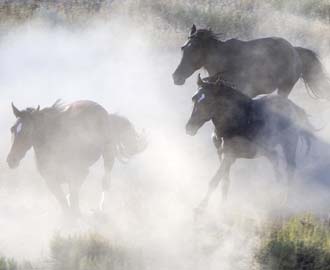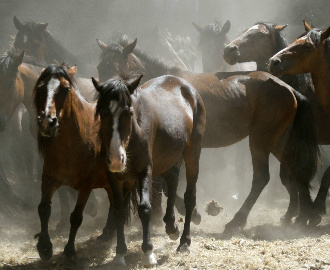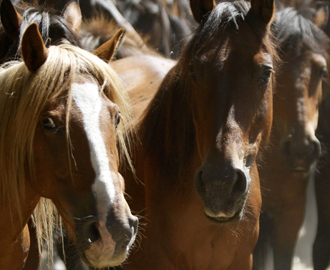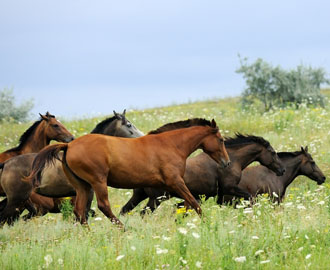Are We Leading Our Wild Horses to Slaughter?
As a new book makes clear, Velma Johnston, a.k.a. "Wild Horse Annie," must be rolling over in her grave at the peril thousands of America's mustangs once again face today.
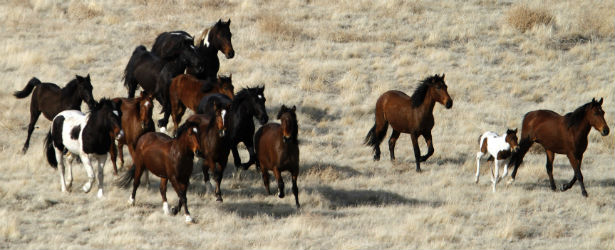
The video below depicts a gruesome roundup in northeastern Nevada of a small band of the nation's wild horses: mustangs who, under federal law and policy, must be protected and managed by the very government agents whose helicopters here terrorize, corral, and injure them. This grim roundup, at the Antelope and Antelope Valley Herd Management Area, occurred in early October. It came just a few days after ProPublica, the non-profit, investigative journalism endeavor, published a damning piece accusing the Bureau of Land Management (BLM) of selling captured wild horses to a known horse slaughterer, which is prohibited by law.
Approximately 180 horses were rounded up in the fashion you're about to watch below. (Or not. I would not show this video to my son, who loves horses.) The Obama Administration's Department of the Interior, led by a rancher, says it must reduce the size of the herd in this particularly violent and dangerous fashion to save the horses from drought and the effects of wildfires, and to bring the herd's number "back into balance with other range land resources and uses." The plan this fall is to "gather" thousands of America's wild horses from nearly 20 venues across the American West, and herd them into dirty, unsafe holding pens -- all at taxpayer expense.
As a matter of logic and economics, this makes no sense. The horses cost us practically nothing when they are left alone in the wild. They cost a fortune to trap and hold. And they are being rounded up at a rate much greater than the rate they can be adopted out, even to genuine horse lovers who have the time and space to give them a home. Today in America, there are perhaps 20,000 more wild horses in domestic pens than there are out on the rangeland. Here, then, is a government program that has gone out of its way to create a "welfare" class in America -- and then seen its federal stewards complain about the costs.
As a matter of politics, however, what's being done to our wild horses makes perfect sense. The ranching and livestock industries, long holders of political power in Congress, want the horses off their grazing land, even though "their" land happens mostly to be "your" land, owned by the federal or state government. These forces always have been opposed to the presence of wild horses on the vast checkerboard of Western rangelands. They have never fully accepted the 1971 federal law designed to protect and mange those horses. And, today, amid feckless regulation and Congressional indifference, they typically get their way.
NO REST FOR THE WEARY -- OR THE VICTORS
If there is one thing this election campaign has taught us, and if the past four rancorous years have reminded us of one immutable truth, it is that while change may be inevitable, progress isn't. Those who lose in American politics, those whose ideas are rejected, those whose time has come and gone, rarely go away forever. Instead, they seem always to come back to us, back to the bullhorns, back with renewed vigor, in one form or another; to fight again, to carry the flag for old prejudices or new grievances or some combination of both, to restore whatever old order they want restored.
There is no rest for the weary -- or the victors. So many of the rights and freedoms, securities and protections, rules and regulations won in one generation must be re-won a generation later from reactionary forces seeking a return to the good old days. On some issues, the debate rolls on through the decades; through the centuries, really. The things our parents fought over sooner or later become our fights. Their victories, ours either to defend or to attack; their losses, ours either to lament or to revenge. No matter who wins the coming election, it will be so -- the end to our great national divisions being nowhere in sight.
MORE ON WILD HORSES
It's always hard to personify this struggle, and especially to personify it in a way that isn't overtly ideological, but let me now give it a shot. I just finished reading Alan Kania's new book, Wild Horse Annie: Velma Johnston And Her Fight to Save the Mustang, a straightforward and indispensable account of one woman's extraordinary success, 40 years ago, in helping to protect America's wild horses from the human predators surrounding them. What happened to Johnston, and now to the federal law she pushed Congress to pass and President Nixon to sign, shows us why we often have to charge back again over hard-fought ground.
Even when Johnston won, she knew she had not really won. Even with the passage of her landmark law, the 1971 Wild and Free-Roaming Horses and Burros Act, Johnston knew that the industries arrayed against wild horses were not going to give up. She knew the horses were still in danger despite the protections they had just received from Congress. She knew that the BLM was, as ever, aligned closely with the industry it was supposed to regulate. She knew all this, and she was right. The value of Kania's work, apart from his tender view of his subject, is that it shows us, relentlessly, how law can be and is subverted by political forces.
THE 'KILLERS'
Today, despite the earnest protestations of wild horse advocates, the Obama Administration has done what so many of its predecessors have done in the past 40 years: placed into mortal peril the wild horses in its trust. In the past 20 years especially, the Bureau of Land Management has acceded to the wishes of the livestock lobby and taken tens of thousands of wild horses off public land. As near as anyone can tell, the Obama Administration has on our behalf received nothing in return from the grazing lobby, not even the promise of higher lease rates to ease the perception that the American people are victims of the dodge of "welfare ranching."
So there are tens of thousands of new "welfare" horses being warehoused at the expense of taxpayers, while livestock and ranching industry operators enjoy the benefits of having their cattle or sheep graze on huge swaths of public land at less than market rates. For the humans involved, it's a sweetheart deal: fewer wild horses drinking less water! For the horses, even with laws that purport to preclude their sale into slaughter -- their sale to what horse advocates call the 'killers' -- it's a looming catastrophe. Here's how Dave Phillips, in his powerful ProPublica piece, recounts what happened next:
[B]y March [2012], government pens and pastures were nearly full. Efforts to find new storage space had fallen flat. So had most attempts to persuade members of the public to adopt horses. Without a way to relieve the pressure, the agency faced a gridlock that would invite lawsuits and potentially cause long-term damage to the range.
So the BLM did something it has done increasingly over the last few years. It turned to a little-known Colorado livestock hauler named Tom Davis who was willing to buy hundreds of horses at a time, sight unseen, for $10 a head. The BLM has sold Davis at least 1,700 wild horses and burros since 2009, agency records show -- 70 percent of the animals purchased through its sale program.
Like all buyers, Davis signs contracts promising that animals bought from the program will not be slaughtered and insists he finds them good homes. But Davis is a longtime advocate of horse slaughter. By his own account, he has ducked Colorado law to move animals across state lines and will not say where they end up. He continues to buy wild horses for slaughter from Indian reservations, which are not protected by the same laws. And since 2010, he has been seeking investors for a slaughterhouse of his own.
For decades, wild horse advocates have warned anyone who would listen that the mustangs could be slaughtered in this fashion if too many of them were taken too quickly from their native ranges. Now it may be happening. "The BLM is settling the stage for the mass slaughter of captured wild horses," said Suzanne Roy, spokeswoman for the American Wild Horse Preservation Campaign. "The American people will not tolerate this reprehensible and illegal treatment of America's cherished mustangs." But so far the American people have tolerated it. There is no Velma Johnston to lead the movement.
THE MAKING OF 'WILD HORSE ANNIE'
Everything old is new again. Sixty years ago, after all, it was the pervasive slaughter of our nation's wild horses by private individuals which helped turn Velma Johnston into "Wild Horse Annie." In 1950, as Kania reminds us, Johnston was driving her way to work one day near Reno when she happened to come up behind a horse trailer that splashed blood onto the road every time it came to a stop. What happened next is one of those rare moments in American history when a person runs straight into her own destiny -- and seems to know it in real-time. Here's how Kania chronicles what happened next:
Mesmerized by the sight, she diverted from her normal route to her job at the bank and followed the horse trailer toward the slaughterhouses on the Nevada-California boarder west off Reno. When the tailgate dropped, she saw the source of the blood was a young colt that had fallen between two adult stallions wedged into the trailer. The older horses had trampled the yearling to death, and it was his blood that was left along the Nevada road. Outraged, Velma began asking questions: Who was conducting these roundups? Where were they going, and why were these horses being treated this way?
Beginning with this awful moment, it took Johnston two decades to attain the height of her political success on behalf of America's wild horses. Small, shy, apolitical, her body wracked by polio, conservative in both her lifestyle and her politics, Johnston first successfully lobbied her local county officials to better protect the horses. Then, in 1955, she convinced Nevada lawmakers to protect the horses on a state-wide level. But even as she was winning these early battles, she understood the nature of the fight to come. She knew that only a strong federal law would prevent horse slaughterers and their agents from "shopping" for venues to ply their bloody trade.
And so Johnston continued to plug away, a reluctant and sometimes cranky hero, and a symbol of a national movement perfectly timed to the politics of the day. In the 1950s and 1960s, many Republican lawmakers in Congress were environmentalists and conservationists, and far more moderate than they are today. Indeed, it is remarkable to look back on Wild Horse Annie's history with lawmakers and to chart the correlation between public opinion -- which always has favored helping the horses -- and the legislation which followed it. Here, for a brief period, a fleeting period, a powerful lobby had to bow to the national interest.
In 1959, nearly a decade after she encountered that bloody horse trailer, a federal statute, popularly called the "Wild Horse Annie" Act of 1959, was placed on the books of Congress. The Act outlawed the use of "aircraft or motor vehicles" to hunt or round up the nation's wild horses. And, twelve years later, one year after Kent State and one year before Watergate, "Wild Horse Annie" pushed passage of an even broader federal law, one she hoped would free the horses from a cycle of capture and slaughter. When President Richard Nixon signed this second law into effect, he wrote:
Wild horses and burros merit man's protection historically -- for they are a living link with the days of the conquistadors, through the heroic times of the Western Indians and the pioneers, to our own day when the tonic of wildness seems all too scarce. More than that, they merit it as a matter of ecological right -- as anyone knows who has ever stood awed at the indomitable spirit and sheer energy of a mustang running free. I am happy to take part in the effort to guarantee their future, and I salute particularly those determined young defenders of the wild horse who have helped give impetus to this effort.
THE GOVERNMENT AND RANCHERS
When asked whether the federal government is investigating the sale of those wild horses to Davis, BLM spokesman Tom Gorey told horse advocates earlier this month via email that the ProPublica article "provides no evidence to support its insinuation that wild horses bought by Mr. Davis ended up in slaughterhouses." The feds make this assertion despite the fact that Davis himself, in the article, seems to incriminate himself. "Hell, some of the finest meat you will ever eat is a fat yearling colt," he told ProPublica. "What's wrong with taking all those BLM horses they got all fat and shiny and setting up a kill plant?"
Now, you run that statement by most any prosecutor with a pulse, and you'd have the makings of criminal investigation. Here's a guy, after all, with evident motive and opportunity to break the law. On its website, the BLM claims, in bold lettering yet: "Note: The BLM has not been selling any wild horses to slaughterhouses or to 'killer buyers.' " But that is an awfully broad statement to make in these circumstances. I wonder what the executives of the Ford Motor Company, which nobly helps sponsor the "Save the Mustangs Fund," think of Tom Davis and the way the BLM has reacted to the ProPublica story?
Surely the good folks at Ford cannot be surprised. The BLM's incurious attitude here is entirely consistent with its pattern and practice of enabling livestock and ranching interests at the expense of wild horses. In Wyoming, for example, the Rock Springs Grazing Association and the Bureau appear recently to have "settled" a dispute over the number of wild horses that will be allowed to continue to roam over rangelands in the southern part of the state. How did the dispute make it into federal court? In 2010, an Interior Department official advised the ranchers to sue the Interior Department. Ladies and gentlemen, your tax dollars at work.
Gorey told me Wednesday via email that the BLM "cannot comment on whether or not an investigation of Mr. Davis is taking place." Perhaps this means such an investigation is underway, and that the feds are following longstanding protocol that frowns upon discussing in public pending criminal investigations. Or perhaps not. I also asked Gorey if, in light of the Davis allegations, the BLM was undertaking an internal review of its sales policies to help protect the horses. His response: "It would be fair to say that the BLM is always looking for ways to implement its programs more effectively, including its sales program."
THE MORE THINGS CHANGE
In 1971, those happy days for wild horse advocates, everyone focused on President Nixon's noble words. Few noticed his hedge. Ever the master politician, ever the cynical realist, Nixon wasn't guaranteeing the nation's wild horses a secure future. He was acknowledging only that his administration was willing to make an "effort" to guarantee it. Even before the president signed the bill into law, and even before Congress passed it -- without criminal sanctions for those who violated it; without adequate funding to ensure its enforcement -- the law's opponents were conjuring up counterfactual assertions and dubious legal arguments against the measure.
The 1971 law required the federal government, through the BLM and its agents, to protect and manage the horses. But just three years later, the scope of the law's weaknesses was clear. Not only had the ranchers found ways to get around it, but the federal agency designated to enforce the law, prodded by the industry it was supposed to regulate, was focusing far more on "managing" than on "protecting" the horses. In June 1974, Sen. Henry M. "Scoop" Jackson, the powerful western Democrat, held a hearing on the horses before the Committee on Interior and Insular Affairs. In his opening statement, he said:
The intent of the Congress in adopting this act is clear -- these animals are to be protected, not managed to extinction. Concern has been expressed that the administration is, in fact, using the act to confine these horses and burros or to rid the range of them altogether; that they would fence-off these animals in zoo-like refuges -- over-managed to the point where the concept of wildness this legislation sought to preserve is destroyed.
A few years after Sen. Jackson spoke those words, Congress passed an amendment that permitted government officials and their agents to again round up horses using helicopters and other mechanized vehicles. A few years after that, the law was revised again to make it easier for old or sick animals to be destroyed. Then came the calamitous reign of Ronald Reagan, the president whose political and personal image was built around great Western symbols like mustangs. His Interior Department tribunes implemented rules making it far easier for wild horses to be sold, or simply given away, for slaughter.
George W. Bush, another president who ran as a cowboy, did no better. During his tenure, the federal law protecting the horses got even looser. In 2004, a legislative rider known as the "Burns Amendment" -- named after Sen. Conrad Burns, the Democrat from Montana -- permitted the BLM to sell wild horses more broadly. Even to people like Tom Davis, for example. The human enemies of the horses are as politically powerful as ever. The bureaucrat defenders of the law often have little stomach for a fight. The courts are loath to intervene. And the public is largely disengaged. This is more or less where the law of "Wild Horse Annie" stands today.
THE LESSON OF 'WILD HORSE ANNIE'
The irony is that, for all the perceptions of her then and now, Johnston was no wild-eyed renegade. She did not advocate that all wild horses everywhere be protected at all costs. She did not oppose reasonable management of the herds. She recognized only that there was enough public land out West -- millions upon millions of acres -- to allow the wild horses to roam free among the cattle and sheep. She believed that there was a workable balance that could be found between competing interests, one that would generate a sustainable peace between the horses and their human enemies. Again, she was right.
She was someone both government and the ranchers could work with, in other words, and no doubt that contributed to her remarkable success. Can you name another person in our lifetime, another regular citizen with no prior political experience, who had such a profound impact on the passage of so much legislation? I can't. But it is easy to see now, with the benefit of hindsight, that the forces arrayed against the horses knew they would inevitably be able to wear down "Wild Horse Annie" and her movement. They knew they had to simply wait her out, and continually pressure the edges, to undermine her cause.
We see some of this today, 40 years later, not just with the Tom Davises of the world but in the way the facts and evidence of this fight are used and abused. For example, the ranchers and their BLM tribunes say, and lawmakers are content to believe, that there is not enough public land for the wild horses. They say there are too many horses on the land even though no one really knows precisely how many horses still roam free. They deny that cattle and livestock, which vastly outnumber the horses, are as hard or harder on the land than the horses. The myths existed long before "Wild Horse Annie." And they exist now, long after her.
In the end, Velma Johnston believed that the American people would support broad protection for the horses if they were given full information about their plight. She believed she could win a fair fight for the future of the herds. But there is little about politics which is fair. She pushed her large rock up that steep hill, bravely, even in the face of death threats, but didn't live long enough to see her opponents, the horses' enemies, push the rock back again. Today, her law still stands, but barely, our horses still in danger. The story of America, the story of "Annie," is that some battles, including the battles most worth fighting, never seem to end.
